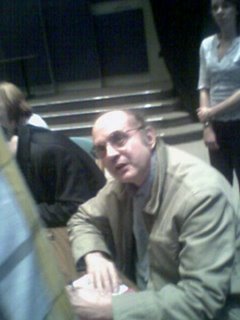 I first met Harvey Pekar way back in late September 1988 at Toronto's "This Ain't The Rosedale Library" for a party/signing to promote Ron Mann's superb documentary "Comic Book Confidential" (where' s the expanded DVD?). Last night, nearly two decades later (!), I had the chance to meet him again at U Of T's Innis Town Hall, where he was part of an evening devoted to comics sponsored by The Beguiling and Pages.
I first met Harvey Pekar way back in late September 1988 at Toronto's "This Ain't The Rosedale Library" for a party/signing to promote Ron Mann's superb documentary "Comic Book Confidential" (where' s the expanded DVD?). Last night, nearly two decades later (!), I had the chance to meet him again at U Of T's Innis Town Hall, where he was part of an evening devoted to comics sponsored by The Beguiling and Pages.After presentations by Mark Madden (the wildly inventive "99 Ways To Tell A Story", and Jessica Abel (the autobiographical "La Perdita), the man of the evening schlumped onstage and laconically mused on the art and business of comics, fame, and his new "American Splendor" book, "Ego & Hubris: The Michael Malice Story".
I admit I've always had a problem with the "indie" comic movement, in that for all of its crusade to have comics legitimized in the eyes of the public (we're supposed to call them "graphic novels", a term that Pekar himself laughs off), its core philosophy hinges on an intolerance that's no different from that of the very people it tries so hard to convince. Both camps maintain that comics are essentially the stuff of juvenile superhero fantasies, simplistic plots, and lowbrow genres (sci-fi, horror)--and that only in the absence of these conventions, ie: "real life" explorations and mundane autobiographies, can the medium earn any artistic or literary value.
Of course, that's rubbish--superhero books have long proven themselves to be just as emotionally involving, thought-provoking, and creatively experimental as any other type of fiction--there's the impulse to dismiss this material by defining it by its worst possible examples. A great deal of "indie" comics are as cloying as all those precious camcorder'd "Sundance" darlings and monotonous "alternative" bands who stay out of the mainstream not because of any daring vision, but because their stuff is 100% self-indulgent and artistically amateurish sh*t.
While I find "realism" overrated and limiting, I feel Pekar's work rises above that of many of his imitators, thanks to varying illustration styles and the author's own spare but archly funny and bittersweet observations and confessions.



